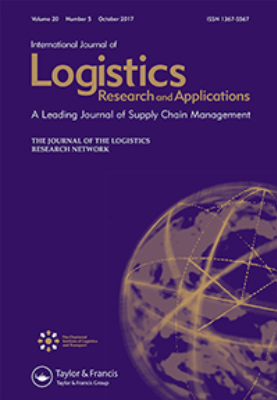考虑最后一英里物流解决方案的可持续性标准权重的城市背景
IF 4.5
3区 管理学
Q1 MANAGEMENT
International Journal of Logistics Research and Applications
Pub Date : 2023-10-03
DOI:10.1080/13675567.2023.2264788
引用次数: 0
摘要
由于对产品需求的增加、人口消费的变化、人工智能质量挑战、人口压力和经济衰退,城市中的最后一英里物流(LML)解决方案已经成为一个优先事项。有许多解决方案可以实现可持续的LML,因为它取决于每个城市的特点和目标。本研究开发了一个加权框架,结合专家判断和背景城市环境,以确定评估可持续LML解决方案时的关键标准。该框架应用于六个欧洲城市,以检查城市环境的敏感性如何影响分配给这些标准的权重。通过分析权重的变化,本研究旨在了解语境因素对语言学习不同方面重要性的影响。我们发现社会和环境的可持续性是必不可少的标准。城市环境对不同解决方案的可持续性影响很大,因为每个城市都有自己的优先事项和挑战。本文所定义的方法可能有助于帮助决策者促进可持续的LML。本文章由计算机程序翻译,如有差异,请以英文原文为准。
Considering the city context in weighting sustainability criteria for last-mile logistics solutions
Last-mile Logistics (LML) solutions in cities have become a priority due to the increasing demand for products, changes in population consumption, ai r quality challenges, population pressure, and economic downturns. There are many solutions to achieve a sustainable LML, as it depends on the characteristics and goals of each city. This study develops a weighting framework incorporating expert judgments and the contextual urban environment to identify the key criteria when evaluating sustainable LML solutions. The framework is applied in six European cities to examine how the sensitivity of the urban context influences the weights assigned to these criteria. By analysing the variations in weights, the study aims to understand the impact of contextual factors on the importance of different aspects of LML. We found that social and environmental sustainability are essential criteria. The urban context significantly influences the sustainability of different solutions, as each city has its own priorities and challenges. The methodology defined in this paper may contribute to helping policymakers to promote sustainable LML.
求助全文
通过发布文献求助,成功后即可免费获取论文全文。
去求助
来源期刊
CiteScore
13.70
自引率
9.10%
发文量
71
期刊介绍:
International Journal of Logistics: Research & Applications publishes original and challenging work that has a clear applicability to the business world. As a result the journal concentrates on papers of an academic journal standard but aimed at the practitioner as much as the academic. High quality contributions are therefore welcomed from both academics and professionals working in the field of logistics and supply chain management. Papers should further our understanding of logistics and supply chain management and make a significant original contribution to knowledge. In this context the term "logistics" is taken in its broadest context as "the management of processes, flow of materials and associated information along the entire supply chain.

 求助内容:
求助内容: 应助结果提醒方式:
应助结果提醒方式:


